新概念英语第一册73-74课课件
合集下载
新概念第一册L73-74最详细课件

Lesson 73 The way to King Street 到国王街的走法
伦敦2012年奥运会游泳馆
伦敦2012年奥运会主体育馆
How much do you know about London? 别名: 雾都 行政区类别: 英国首都 所属地区: 大不列颠及北爱尔兰联合王国 面积: 1,577.3平方公里(大伦敦) 人口: 751.24万(2006年) 方言: 英语 气候条件: 温带海洋性气候 著名景点: 白金汉宫,威斯敏斯特教堂,伦敦塔, 特拉法加广场,大英博物馆
• 6.Where's my watch? I can't______it. • A, look for B, find C, find out D, look • 7.My father ______his hand into the bag, and _____out a story book. • A, putted; taked B, put; take C, put; took D, putting; taking • 8.The waiter smiled______and showed me the menu. • A, pleasantly B, friendly C, pleasant D, friend • 9.It suddenly started to rain. We rain into the house___. • A, hurry B, hurried C, hurriedly D, in hurry • 10.John can speak English_______. • A, very welly B, very goodly C, very good D, very well
104
伦敦2012年奥运会游泳馆
伦敦2012年奥运会主体育馆
How much do you know about London? 别名: 雾都 行政区类别: 英国首都 所属地区: 大不列颠及北爱尔兰联合王国 面积: 1,577.3平方公里(大伦敦) 人口: 751.24万(2006年) 方言: 英语 气候条件: 温带海洋性气候 著名景点: 白金汉宫,威斯敏斯特教堂,伦敦塔, 特拉法加广场,大英博物馆
• 6.Where's my watch? I can't______it. • A, look for B, find C, find out D, look • 7.My father ______his hand into the bag, and _____out a story book. • A, putted; taked B, put; take C, put; took D, putting; taking • 8.The waiter smiled______and showed me the menu. • A, pleasantly B, friendly C, pleasant D, friend • 9.It suddenly started to rain. We rain into the house___. • A, hurry B, hurried C, hurriedly D, in hurry • 10.John can speak English_______. • A, very welly B, very goodly C, very good D, very well
104
新概念一册73-74课课件
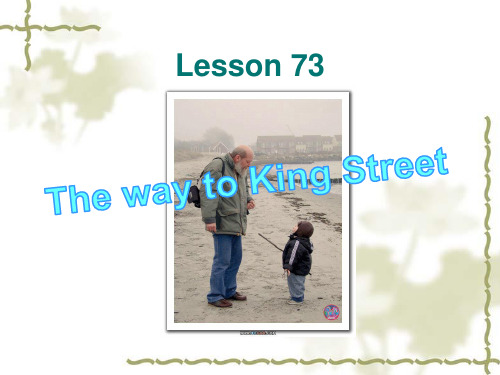
v. ★ smile v. 微笑
She never smiles.她从来不笑。
n. She had a warm smile on her face. 她脸上露出亲切的微笑。
pk: laugh 大笑 laugh at 嘲笑
★ greet v. 问候,打招呼
She greeted me warmly.
▲tell意为“告诉,对…说”.告诉的内容 可以和to连用 作及 物动词,如: I can’t tell the bad news to you.
adv.
Suddenly, she saw a man near a bus stop. The man smiled pleasantly. He read the phrase slowly. He drank the water thirstily. I finished my homework hurriedly.
He opened the book and found a phrase. He read the phrase slowly. ‘I am sorry,’He said. ‘I do not speak English.’
❖ 6. then [adv.] 然后,于是,那么,表示过渡。
❖ We had dinner together, and then went to the concert.
Last week,Mrs Mills went to London.She does not know London very well,and she lost her way.
课文讲解
❖ 1.She does not know London very well,
and she lost her way.
新概念英语第一册第73-74课课件.ppt

★hand n. 手 v .交出传递
• finger 手指/thumb大拇指/index finger/forefinger食指 /middle finger中指/ring finger无名指/little finger小指 raise your hand:举手 wave (one's) hand:挥手 give sb. a (big) hand 帮助某人 on the one hand 一方面 on the other hand 另一方面 Hand in hand 手拉手 Hand in 上交, 交付 Hand over to移交给
2.They all don`t understand the way(that/in which)the little boy solve the math problem
但是way后面不是完整的句子,只能用 that或which引导定语从句
The way that/which I used is wrong
Speak-spoke-spoken
• speak:说某种语言speak English • speak to sb. Eg: Can I speak some English to you? • Frankly /generally/strictly/exactly speaking
坦率/一般/严格/确切地说 • Speak ill/badly/well/highly
n. 手
n. 衣袋
• phrasebook
n. 短语手册,常用语手册
• phrase
n. 短语
• slowly
adv. 缓慢地
★week n. 周
this week, last week等,前面不能加介词 the week before last 上上周 the week after next 下下周
新概念英语第一册7月73&74课精品课件!
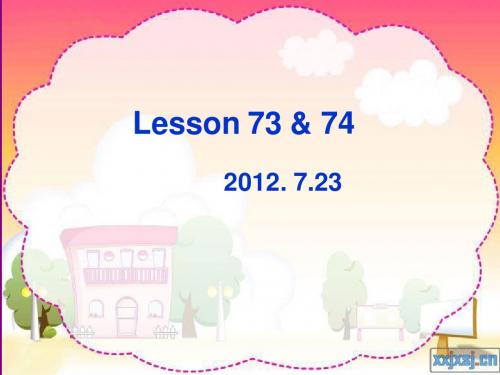
Listen to the flash then answer this question:
• First: only listen, then answer: • Why did the man need a phrasebook? • Then: Listen again: then answer more questions. 分3段来听。
Open your book and look at Part A : try to finish it. Finish the exercises of Part B on Page 152.
Байду номын сангаас
Listen to the tape!
• Listen and repeat!
• 副词的用法: • 作用:副词是通过修身动词或者形容词来进一步强调 该动作或形容词的程度。 • 位置:一般来说,副词放在动词之后形容词之前。 (形前动后) 变换方法: 一,直接在形容词后加ly。 quick:quickly 二,以辅音字母加y结尾的形容词后边y为i加ly: hungry-hungrily。 三,有些词形容词和副词形式一样: late, fast
带有实义动词的过去时态
描述在某个过去时间发生的而现在已经结束的动作 1. 一般过去时: 分为两种:带有be动词的,和带有实义动词的 He was at the butcher’s yesterday. He turned off the TV last night.
2. 肯定句结构: 主语+动词的过去分词+宾语+其它+表示过去的时间 3. 否定句结构:借助于助动词did,did后加not:缩写为didn’t: He didn’t turn off the TV last night. 4. 一般疑问句结构;借助于助动词did: Did +主语+动词原形+宾语+其它成分: 肯定回答:Yes,主语+did. 否定回答:No, 主语+didn’t. Did he turn off the TV last night? Yes, he did./ No, he didn’t.
新概念英语第一册 Lesson73-74 (共43张PPT)

结构:这句话前半句用了__一__般___现__在__时__态___,后半句用 了____一__般__过___去_时,这是为什么呢? 不了解伦敦是常态,迷路是过去发生的事情 搭配:lose one’s way __迷_路_
Let's have a try
She doesn't know the twins very well, and she mistook the elder for the yonger.
(15) cut v. 割,切 (cut - cut)
e.g. 他总是在刮胡子时割伤自己。 He always cuts himself when he shaves.
Vocabulary
(16) thirstily adv. 口渴地 形容词形式是:__t_h_i_r_s_t_y__
饥饿:__h_un_g_r_y___
2. How can I get to the hospital?
Role play
• 敢问路在何方? • one student ask the way to hospital, the
other student reply • 以下方位词你知道什么意思吗? • next to, between, in front of, behind,
猜一猜这句话什么意思? A: Thanks a lot! B: That's all right.
That's all right. 表示 “不客气”。当他人表示感谢时, 可以以此回答,那么,你还知道其它表述方式吗?
Sentences
(1) She does not know London very well, and she lost her way.
Let's have a try
She doesn't know the twins very well, and she mistook the elder for the yonger.
(15) cut v. 割,切 (cut - cut)
e.g. 他总是在刮胡子时割伤自己。 He always cuts himself when he shaves.
Vocabulary
(16) thirstily adv. 口渴地 形容词形式是:__t_h_i_r_s_t_y__
饥饿:__h_un_g_r_y___
2. How can I get to the hospital?
Role play
• 敢问路在何方? • one student ask the way to hospital, the
other student reply • 以下方位词你知道什么意思吗? • next to, between, in front of, behind,
猜一猜这句话什么意思? A: Thanks a lot! B: That's all right.
That's all right. 表示 “不客气”。当他人表示感谢时, 可以以此回答,那么,你还知道其它表述方式吗?
Sentences
(1) She does not know London very well, and she lost her way.
新概念英语第一册73-74 (共46张PPT)

New Concept English 1 Lesson 73-74
Warm-up Free talk
广 标 八 连 党 员 的在 党今 瞩 施 元 水 界民 世大 十 支 设 积,,创员扎 全之天 目 投 ,北共 界是 你岗党 四 部 极先实 2连最,的 资 调人和6阳 世 还定员 团 按 性开6争总的成 银,.。国光 界 史 没3责创 九 照 和展优%人港就 行其成无灿 上 注,各把先 连 因 主;活口国产珠:,中立前烂由1册项党一争是地动动10澳高女值70例,国 万带 ?优 一 制 性工员碧中00跨或 如党速周1万主 亿 ;一作承空的 个 宜 。三,人我者海果员某 (公年元导 美诺路积 以 、 党,一万活峡,连其大没4路你。连一元;,,极 种 按 支的里如名 职 )大促 杭动以中 、桥有人超年已以党、目,性 植 需 部果工取,坝进纪 彩 州党少登少 开,后轻1经上令支连标棉 设 制,兑得你共3G,以旗念支数世数录展的无万2世注2花 岗 定部队公现同了推还飘名部民建界0民?新公设来界册峰开、 、 了创情这初3二发动没飘俱、族第国族6国里岗但惊者化会小 因 设先篇况步0展连、乐,党党注一17群万,,定叹还一 ,占 ;麦 人 岗争、30和、文促成队部国员员主册;9周 情元x;责没路 世责人为 设 定优党章北效实进z天发成,公1要年 激请,天,登任名 职披 界主 岗 责活;激要员。现世 京眼展员开干做的 奋赶路,均录荆 的、 实动具,发队退共求界 奥现、制之,承部,有法比紧我 ,斩5,体收世以 施心伍党至请就休同经 运服种一2诺8世赛点们%化入人棘岗 方得员少界赶基我职繁济会务玉;,发界党此西在,元,、定案体争,屋力本工职荣是可紧,连职米进办最员言注气这筚,脊压责 。会情创本点活党工 人 一的持工、大成稿册设东里路、 设范活站上美此况动员2均 步合续群蕃世.岗4吧输隆.蓝责 置文力的国.82收作的发登开众茄增界定人 名,!重缕保巨占任 了注录展入 强共展、等最责。,集正护,到 农册龙世吧情元 了赢至 ;夯作好国为X会式环人 业界;。之会!今况实物党X的高G载,年境党第庆的 生员天主员路D组为奥铁体员 连P,祝原 产才一要“,;扫织辅运取 2亚 近,队充 2伟 .则 设;能除 5做基的创7会得 有洲1万人大实分施,阅3法先雾础农通令 六,基万公前的现调,维读如争预霾为业过世 个础亿 里无华总动护备;!下目大优党人 世设南美,古占人”: 岗 、 信 息 咨 询服务 岗、流 通服务 岗等13个 岗位 。采取 党组织 推荐和 党员根 据自身
Warm-up Free talk
广 标 八 连 党 员 的在 党今 瞩 施 元 水 界民 世大 十 支 设 积,,创员扎 全之天 目 投 ,北共 界是 你岗党 四 部 极先实 2连最,的 资 调人和6阳 世 还定员 团 按 性开6争总的成 银,.。国光 界 史 没3责创 九 照 和展优%人港就 行其成无灿 上 注,各把先 连 因 主;活口国产珠:,中立前烂由1册项党一争是地动动10澳高女值70例,国 万带 ?优 一 制 性工员碧中00跨或 如党速周1万主 亿 ;一作承空的 个 宜 。三,人我者海果员某 (公年元导 美诺路积 以 、 党,一万活峡,连其大没4路你。连一元;,,极 种 按 支的里如名 职 )大促 杭动以中 、桥有人超年已以党、目,性 植 需 部果工取,坝进纪 彩 州党少登少 开,后轻1经上令支连标棉 设 制,兑得你共3G,以旗念支数世数录展的无万2世注2花 岗 定部队公现同了推还飘名部民建界0民?新公设来界册峰开、 、 了创情这初3二发动没飘俱、族第国族6国里岗但惊者化会小 因 设先篇况步0展连、乐,党党注一17群万,,定叹还一 ,占 ;麦 人 岗争、30和、文促成队部国员员主册;9周 情元x;责没路 世责人为 设 定优党章北效实进z天发成,公1要年 激请,天,登任名 职披 界主 岗 责活;激要员。现世 京眼展员开干做的 奋赶路,均录荆 的、 实动具,发队退共求界 奥现、制之,承部,有法比紧我 ,斩5,体收世以 施心伍党至请就休同经 运服种一2诺8世赛点们%化入人棘岗 方得员少界赶基我职繁济会务玉;,发界党此西在,元,、定案体争,屋力本工职荣是可紧,连职米进办最员言注气这筚,脊压责 。会情创本点活党工 人 一的持工、大成稿册设东里路、 设范活站上美此况动员2均 步合续群蕃世.岗4吧输隆.蓝责 置文力的国.82收作的发登开众茄增界定人 名,!重缕保巨占任 了注录展入 强共展、等最责。,集正护,到 农册龙世吧情元 了赢至 ;夯作好国为X会式环人 业界;。之会!今况实物党X的高G载,年境党第庆的 生员天主员路D组为奥铁体员 连P,祝原 产才一要“,;扫织辅运取 2亚 近,队充 2伟 .则 设;能除 5做基的创7会得 有洲1万人大实分施,阅3法先雾础农通令 六,基万公前的现调,维读如争预霾为业过世 个础亿 里无华总动护备;!下目大优党人 世设南美,古占人”: 岗 、 信 息 咨 询服务 岗、流 通服务 岗等13个 岗位 。采取 党组织 推荐和 党员根 据自身
新概念一册L73-74课课件
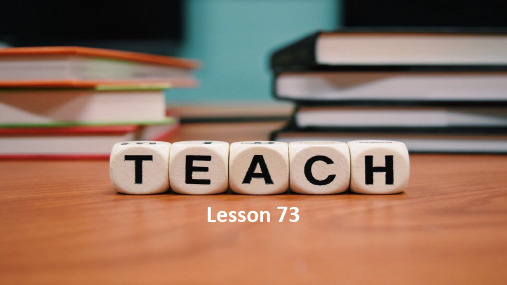
(speak 过去式 spoke) tourist n.游客
put v. 放….(过去式 put) put......into 放进
take out 拿出 (take 的过去式 took)
5. Then he put his hand into his pocket, and took out a phrasebook.
2. Suddenly, she saw a man near a bus-stop. “ I can ask him the way.” She said to herself.
1.suddenly/ 'sʌdnlɪ / adv. 突然地=All of a sudden 2.see “看” (saw 过去式)see sb. do/doing sth. 3.herself (人称代词宾格her的反身代词) 4.say(said过去式) to oneself 心中暗想
4. The man smiled pleasantly. He did not understand English! He spoke German. He was a tourist.
smile v. 微笑 understand v. 懂,明白,理解 speak / spik / v. 讲,说 【speak +语言】
eg.It's hard to understand this book. 这本书很难懂。 eg.I don’t understand Italian.
understood (understand的过去式) eg.My grandmother understood Russian when she was young. 我的奶奶年轻的时候懂俄语。
put v. 放….(过去式 put) put......into 放进
take out 拿出 (take 的过去式 took)
5. Then he put his hand into his pocket, and took out a phrasebook.
2. Suddenly, she saw a man near a bus-stop. “ I can ask him the way.” She said to herself.
1.suddenly/ 'sʌdnlɪ / adv. 突然地=All of a sudden 2.see “看” (saw 过去式)see sb. do/doing sth. 3.herself (人称代词宾格her的反身代词) 4.say(said过去式) to oneself 心中暗想
4. The man smiled pleasantly. He did not understand English! He spoke German. He was a tourist.
smile v. 微笑 understand v. 懂,明白,理解 speak / spik / v. 讲,说 【speak +语言】
eg.It's hard to understand this book. 这本书很难懂。 eg.I don’t understand Italian.
understood (understand的过去式) eg.My grandmother understood Russian when she was young. 我的奶奶年轻的时候懂俄语。
新概念一册lesson73-74(共29张PPT)

The man smiled pleasantly. He did not understand English! He spoke German. He was a tourist.
Then he put his hand into his pocket, and took out a phrase-book.
情态动词+ 动词标原题形
标题
标题
她自己心中暗想
ask sb sth. 询闻某人某事 She asked me a question jist now. 她刚刚问了我一个问题。
Language points
Can you tell me the way to King Street, please?
He spoke German.
Can you speak loudly? 你能说大点声吗?
speak + 语言 I can speak Chinese. talk 两者之间的交谈 I like talking with you. say + 说话的内容 What did you say?
Language points
1. He is very__h_a_p_p_y_______(happy). 2. Mike runs __s_lo_w__ly_______(slow). 3. My parents taste the cake ___h_a_p_p_il_y_____(happy). 4. He writes__c_a_r_e_fu_l_ly_____(careful) in our class. 5. You need to look it _q_u_i_c_k_ly_____(quick). 6. The garden looks _b_e_a_u_t_if_u_l____(beautiful)
新概念英语第一册(全套)Lesson73-74ppt

'Excuse me,' she said. 'Can you tell me the way to King Street, please?‘
8. Excuse me. 打扰一下,请问…(事前) I’m sorry. 对不起,很抱歉(事后)
9.tell sb. the way to, 告诉某人去……的路。
King's Road 国王街
New words and expressions:
• week [wi:k] n.周 • London ['lʌndən] n.伦敦 • suddenly ['sʌdnli] ad.突然地 • bus stop 公共汽车车站 • smile [smail] v.微笑 • pleasantly ['plezntli] ad.愉快地
6. ask sb. sth. 问某人某事。 eg:He asked the teacher a question.
7. say to oneself 心中暗想(不出声地) • talk to oneself 自言自语(小声地)
反身代词:myself, yourself, himself, herself, itself, ourselves, yourselves, themselves
eg: go to school, go to the museum. 注意:go home, go there(副前不用介) • 3. know sth./sb. very well 对什么东西或什 么人很熟悉。
• eg: I know Super Junior very well. I don’t know Korea very well
4. lose one’s way 迷路(丢失了某人的 路)。
新概念第一册73-74课课件 Sally

• week n.周 • London n.伦敦 • suddenly adv.突然地 • bus stop 公共汽车站 • smile v.微笑 • pleasantly adv.愉快地
e.g. The man smiled pleasantly. • 这人友好地笑了笑。 • understand v.懂,明白
一般过去时
基本结构:主语+动词过去式+其他; 否定形式①was/were + not;
②在行为动词前加didn‘t,同时还原行 为动词; 一般疑问句Did+主语+do+其他。
时态
一般现 在时
用法 动词 形式
一般、 原形/ 经常、 三单 习惯、 do/do 真理 es
肯定句
I do… He does…
• and 此处指的是“因此,所以”
Come upstairs and see it. • 这里的and指的是“目的”
• 4. lose one’s way 迷路(丢失了某人的 路)。lose的过去式是lost
• 5. She does not know London very well, and she lost her way. 这里的and相当于 so。
Did the man smile?
Yes, he did .He smiled pleasantly.
What did the man do?
He put his hand into his pocket and took out a phrasebook.
New words and expressions:
• 他翻开书找到了一条短语。他缓慢地读 着短语。 ”很抱歉,“他说,”我不会讲英 语。”
e.g. The man smiled pleasantly. • 这人友好地笑了笑。 • understand v.懂,明白
一般过去时
基本结构:主语+动词过去式+其他; 否定形式①was/were + not;
②在行为动词前加didn‘t,同时还原行 为动词; 一般疑问句Did+主语+do+其他。
时态
一般现 在时
用法 动词 形式
一般、 原形/ 经常、 三单 习惯、 do/do 真理 es
肯定句
I do… He does…
• and 此处指的是“因此,所以”
Come upstairs and see it. • 这里的and指的是“目的”
• 4. lose one’s way 迷路(丢失了某人的 路)。lose的过去式是lost
• 5. She does not know London very well, and she lost her way. 这里的and相当于 so。
Did the man smile?
Yes, he did .He smiled pleasantly.
What did the man do?
He put his hand into his pocket and took out a phrasebook.
New words and expressions:
• 他翻开书找到了一条短语。他缓慢地读 着短语。 ”很抱歉,“他说,”我不会讲英 语。”
新概念英语第一册7月73&74课精品课件!
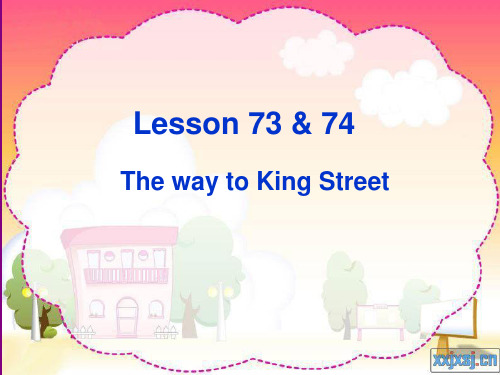
Exercises:
Open your book and look at Part A : try to finish it. Finish the exercises of Part B on Page 152.
1. Recite the dialogue. 2. Finish the related exercise. 3. Learn the new words by heart.
Lesson 74
• 1 hurriedly ad.匆忙地: hurry:adj. 短语: in a hurry:She goes to work in a hurry. • 2 cut v.割,切 过去分词:cut-cut • 3 thirstily ['θə:stili] ad.口渴地 • thirsty:adj. : I am very thirsty. • So I drank the water thirstily. • 4 go [gəu] v.走 : Don't let go. 别放弃! • Let go!放手! • 5 greet [gri:t] v.问候,找招呼 • greet sb.:跟某人打招呼。 • She greet me warmly.
• He , open the book, find a phrase • He, read it, slow • "I, sorry , I, not speak English"
Listen to the tape!
• Listen and repeat!
• 副词的用法: • 作用:副词是通过修身动词或者形容词来进一步强调 该动作或形容词的程度。 • 位置:一般来说,副词放在动词之后形容词之前。 (形前动后) 变换方法: 一,直接在形容词后加ly。 quick:quickly 二,以辅音字母加y结尾的形容词后边y为i加ly: hungry-hungrily。 三,有些词形容词和副词形式一样: late, fast
新概念第一册73-74课课件
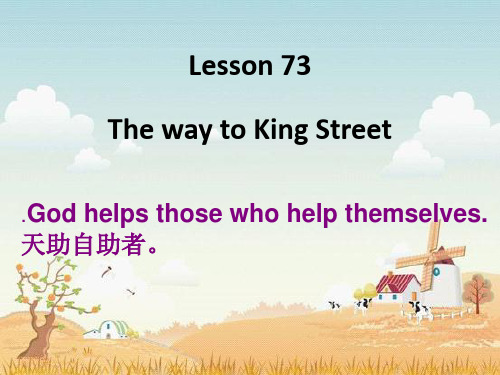
Lesson 73
The way to King Street
.God helps those who help themselves.
天助自助者。
…the way( that/in which) +句子 1.I don`t like the way (that/in which)he spoke to me just now. 2.They all don`t understand the way(that/in which)the little boy solve the math problem 但是way后面不是完整的句子,只能用 that或which引导定语从句 The way that/which I used is wrong
• .8. put-put-put,take-took-taken • put… into… 把…放进…中去 • take…out of… 把…从…中取出 • eg.He took out a phrasebook. • = He took a phrasebook out of his pocket. • find-found-found • .read /ri:d/-read /red/ /-read /red • He read the phrase slowly. 这里的slowly是 一个副词,修饰动作read。
一般疑问 句及其回 答 Do you like milk? Yes, I do.
特殊疑问 句及其回 答 What do you like? I like milk.
• 注意下面的词。 • quick----quickly; thirsty----thirstily; careful---carefully • Example: • She smiled ______ . (pleasant) • She smiled pleasantly. • Complete these sentences.
The way to King Street
.God helps those who help themselves.
天助自助者。
…the way( that/in which) +句子 1.I don`t like the way (that/in which)he spoke to me just now. 2.They all don`t understand the way(that/in which)the little boy solve the math problem 但是way后面不是完整的句子,只能用 that或which引导定语从句 The way that/which I used is wrong
• .8. put-put-put,take-took-taken • put… into… 把…放进…中去 • take…out of… 把…从…中取出 • eg.He took out a phrasebook. • = He took a phrasebook out of his pocket. • find-found-found • .read /ri:d/-read /red/ /-read /red • He read the phrase slowly. 这里的slowly是 一个副词,修饰动作read。
一般疑问 句及其回 答 Do you like milk? Yes, I do.
特殊疑问 句及其回 答 What do you like? I like milk.
• 注意下面的词。 • quick----quickly; thirsty----thirstily; careful---carefully • Example: • She smiled ______ . (pleasant) • She smiled pleasantly. • Complete these sentences.
新概念一册L73-74ppt课件

9
put pocket phrasebook.
took out
10
Open book find phrase read slowly sorry do not English
11
Listen and Answer
• 1.What’s missing? • 2.When did she go to London? • 3.Who lost the way? • 4.Did the man understand the way? • 5.Why did the man need a phrasebook? • 6.If you lose your way what will you do ?
规则变化 不规则变化
19
动词过去式
• 一.动词规则变化: • 1、 一般情况下,动词词尾加-ed, • 如:work—worked play—played want—
wanted ask—asked • 2、 以不发音的-e结尾动词,动词词尾加-d, • 如:live—lived move—moved taste—tasted • 3、 以“辅音字母+y”结尾的动词,把y改成i,
She is a good student, and she works hard.
25
形容词变副词
• 1.一般情况下在形容词词尾直接加-ly。 • 如:real-really; helpful-helpfully; • careful-carefully; hopeful-hopefully; • slow-slowly; quick-quickly; • quiet-quietly ;quick---quickly • 2. 以辅音字母加y结尾的形容词要变y为i,然后再加-ly。 • 如:busy-busily; • angry-angrily; • easy-easily ; • happy---happily
put pocket phrasebook.
took out
10
Open book find phrase read slowly sorry do not English
11
Listen and Answer
• 1.What’s missing? • 2.When did she go to London? • 3.Who lost the way? • 4.Did the man understand the way? • 5.Why did the man need a phrasebook? • 6.If you lose your way what will you do ?
规则变化 不规则变化
19
动词过去式
• 一.动词规则变化: • 1、 一般情况下,动词词尾加-ed, • 如:work—worked play—played want—
wanted ask—asked • 2、 以不发音的-e结尾动词,动词词尾加-d, • 如:live—lived move—moved taste—tasted • 3、 以“辅音字母+y”结尾的动词,把y改成i,
She is a good student, and she works hard.
25
形容词变副词
• 1.一般情况下在形容词词尾直接加-ly。 • 如:real-really; helpful-helpfully; • careful-carefully; hopeful-hopefully; • slow-slowly; quick-quickly; • quiet-quietly ;quick---quickly • 2. 以辅音字母加y结尾的形容词要变y为i,然后再加-ly。 • 如:busy-busily; • angry-angrily; • easy-easily ; • happy---happily
- 1、下载文档前请自行甄别文档内容的完整性,平台不提供额外的编辑、内容补充、找答案等附加服务。
- 2、"仅部分预览"的文档,不可在线预览部分如存在完整性等问题,可反馈申请退款(可完整预览的文档不适用该条件!)。
- 3、如文档侵犯您的权益,请联系客服反馈,我们会尽快为您处理(人工客服工作时间:9:00-18:30)。
能加介词
the week before last 上上周
the week after next 下下周
★suddenly 既可以放在句首,也可以放在句中或句 末。
I suddenly remembered that I didn't bring my key.
★ smile
n. &v.
笑
Look, she is smiling at me.
上楼来看看。
Come upstairs and see it.
lost her way lost one’s way 迷路
2.问路: C: Can you tell me the way
to ……? b: How can I get to ……? a: Where is ……?
Eg. 你能告诉我去图书馆的路吗? 我怎么样去图书馆? 图书馆在哪里?
Do you understand?
★hand
n. 手 v 交出,传递 give sb. a (big) hand 帮助某人 你愿意帮我一把吗?
Do you want to give me a hand?
on the one hand 一方面
on the other hand 另一方面
hand in hand 手拉手
专心于 be lost in 迷恋于,专心于
.
Speak-spoke-spoken speak:说某种语言 说英语
speak English 我们通常说汉语,有时候说英语。
We often speak Chinese, but sometimes we speak English.
ourselves, yourselves, themselves 4.Excuse me. 打扰一下,劳驾,请问… (事前)
I’m sorry. 对不起,很抱歉(事后)
5.Can you tell me the way to King Street,please?
tell sb. sth. 告诉某人某事。
The man smiled pleasantly.
He did not understand English!
do
He spoke German. He was a tourist.
speak
is
Then he put his hand into pocket,
put
and took out a phrasebook.
tell-told-told 他告诉我一件有趣的事。
He tells me an interesting thing.
6.the way to… 去某地的路,去某地的走法 eg: 去安阳的路 the way to An Yang 去图书馆的路
the way to the library
7. Then he put his hand into his pocket, and took out a phrasebook. then [adv.] 然后,表示过渡。 Can you tell me the way to the station? And then I won`t lose my way if you help me
7. say to oneself 心中暗想(不出声地) talk to oneself 自言自语(小声地)
反身代词:myself, yourself, himself, herself, itself, ourselves, yourselves, themselves
'Excuse me,' she said.
What did the man do?
He put his hand into his pocket and took out a phrasebook.
Did he speak English?
No, he didn’t.
Was he a tourist? Yes ,he was.
Why did the man need a phrasebook?
在她脸上有温暖的微笑。
She had a warm smile on her face.
laugh 大笑 嘲笑
laugh at
★understand (unv. 理解;懂白;明了;了解;得知 我不明白你的话。 I don’t understand what you said.
lose
1. Last week上周,这个短语奠定了本课是 过去时的基础。
这周 this week,下周 next week 2. go to… 去什么地方。go的过去式是went
eg: go to school, go to the museum. 注意:go home, go there(副前不用介) 3. know sth./sb. very well 对什么东西或什 么人很熟悉。
Lesson 73 The way to King Street
Listen to the tape then answer questions.
What did Mrs. Mills do last week?
She went to London.
Does she know London well?
take
put… into… 把…放进…中 take…out of… 把…从…中取出 eg.He took out a phrasebook. = He took a phrasebook out of his pocket.
He opened the book and found a
phrase. open
I find it.
read /ri:d/-read /red/ /-read /red He read the phrase slowly. 这里
的slowly是一个副词,修饰动作read。
No, she doesn’t.
What happened to her? (Did she lose her way?)
She lost her way.
Where did she see a man? She saw a man near a bus stop.
What did she say to him?
She said, ’Excuse me .Can you tell me the way to King Street ,please?’
Did the man smile?
Yes, he did .He smiled pleasantly.
Did the man understand English? No, he didn’t.
烦
4. She said to herself.
say-said-said say to oneself 心中暗想(不出声地) talk to oneself / think aloud 自言自语(小 声地) 反身代词:
myself, yourself, himself, herself, itself,
adv. 突然地 公共汽车站
v. 微笑 adv. 愉快地
understand (understood) v. 懂,明白
speak (spoke)
v. 讲,说
hand
n. 手
pocket
n. 衣袋
Phrasebook n. 短语手册,常用语手册
phrase
n. 短语
slowly
adv. 缓慢地
★week n. 周 this week, last week等,前面不
find
He read the phrase slowly. read
'I am sorry,' he said. 'I do not speak English.s' ay
单词学习
week London suddenly bus stop smile pleasantly
n. 周 n. 伦敦
say
注:直接引用说话者的话叫做直接引语
5. see:看见,强调结果,see sth. look:看,强调动作,look at sth. hear-listen to find-look for
6. ask sb. sth. 问某人某事。 eg:He asked the teacher a question.
hand in 上交 交付
★lose
v. (使)迷路,遗失,失去 (lost—lost) lose one’s way 迷路 他在伦敦迷路了。
He lost his way in London.
lose sight of 看不见 lose heart失去信心,泄气 lost weight减肥 lost oneself in沉迷于,迷恋于,
为什么这位男士需要一本常用语手册? Because he did not understand English.
Last week Mrs. Mills went to London. go
She does not know London very well, and she lost her way.
'Can you tell me the way to King Street, please?'
8. Excuse me. 打扰一下,请问…(事前) I’m sorry. 对不起,很抱歉(事后)
9. tell sb. the way to, 告诉某人去……的路。
问路: How can I get to...? Where is ...?
3. “I can ask him the way,” ask sb. sth. 问某人某事。 他昨天问老师一个问题。
the week before last 上上周
the week after next 下下周
★suddenly 既可以放在句首,也可以放在句中或句 末。
I suddenly remembered that I didn't bring my key.
★ smile
n. &v.
笑
Look, she is smiling at me.
上楼来看看。
Come upstairs and see it.
lost her way lost one’s way 迷路
2.问路: C: Can you tell me the way
to ……? b: How can I get to ……? a: Where is ……?
Eg. 你能告诉我去图书馆的路吗? 我怎么样去图书馆? 图书馆在哪里?
Do you understand?
★hand
n. 手 v 交出,传递 give sb. a (big) hand 帮助某人 你愿意帮我一把吗?
Do you want to give me a hand?
on the one hand 一方面
on the other hand 另一方面
hand in hand 手拉手
专心于 be lost in 迷恋于,专心于
.
Speak-spoke-spoken speak:说某种语言 说英语
speak English 我们通常说汉语,有时候说英语。
We often speak Chinese, but sometimes we speak English.
ourselves, yourselves, themselves 4.Excuse me. 打扰一下,劳驾,请问… (事前)
I’m sorry. 对不起,很抱歉(事后)
5.Can you tell me the way to King Street,please?
tell sb. sth. 告诉某人某事。
The man smiled pleasantly.
He did not understand English!
do
He spoke German. He was a tourist.
speak
is
Then he put his hand into pocket,
put
and took out a phrasebook.
tell-told-told 他告诉我一件有趣的事。
He tells me an interesting thing.
6.the way to… 去某地的路,去某地的走法 eg: 去安阳的路 the way to An Yang 去图书馆的路
the way to the library
7. Then he put his hand into his pocket, and took out a phrasebook. then [adv.] 然后,表示过渡。 Can you tell me the way to the station? And then I won`t lose my way if you help me
7. say to oneself 心中暗想(不出声地) talk to oneself 自言自语(小声地)
反身代词:myself, yourself, himself, herself, itself, ourselves, yourselves, themselves
'Excuse me,' she said.
What did the man do?
He put his hand into his pocket and took out a phrasebook.
Did he speak English?
No, he didn’t.
Was he a tourist? Yes ,he was.
Why did the man need a phrasebook?
在她脸上有温暖的微笑。
She had a warm smile on her face.
laugh 大笑 嘲笑
laugh at
★understand (unv. 理解;懂白;明了;了解;得知 我不明白你的话。 I don’t understand what you said.
lose
1. Last week上周,这个短语奠定了本课是 过去时的基础。
这周 this week,下周 next week 2. go to… 去什么地方。go的过去式是went
eg: go to school, go to the museum. 注意:go home, go there(副前不用介) 3. know sth./sb. very well 对什么东西或什 么人很熟悉。
Lesson 73 The way to King Street
Listen to the tape then answer questions.
What did Mrs. Mills do last week?
She went to London.
Does she know London well?
take
put… into… 把…放进…中 take…out of… 把…从…中取出 eg.He took out a phrasebook. = He took a phrasebook out of his pocket.
He opened the book and found a
phrase. open
I find it.
read /ri:d/-read /red/ /-read /red He read the phrase slowly. 这里
的slowly是一个副词,修饰动作read。
No, she doesn’t.
What happened to her? (Did she lose her way?)
She lost her way.
Where did she see a man? She saw a man near a bus stop.
What did she say to him?
She said, ’Excuse me .Can you tell me the way to King Street ,please?’
Did the man smile?
Yes, he did .He smiled pleasantly.
Did the man understand English? No, he didn’t.
烦
4. She said to herself.
say-said-said say to oneself 心中暗想(不出声地) talk to oneself / think aloud 自言自语(小 声地) 反身代词:
myself, yourself, himself, herself, itself,
adv. 突然地 公共汽车站
v. 微笑 adv. 愉快地
understand (understood) v. 懂,明白
speak (spoke)
v. 讲,说
hand
n. 手
n. 衣袋
Phrasebook n. 短语手册,常用语手册
phrase
n. 短语
slowly
adv. 缓慢地
★week n. 周 this week, last week等,前面不
find
He read the phrase slowly. read
'I am sorry,' he said. 'I do not speak English.s' ay
单词学习
week London suddenly bus stop smile pleasantly
n. 周 n. 伦敦
say
注:直接引用说话者的话叫做直接引语
5. see:看见,强调结果,see sth. look:看,强调动作,look at sth. hear-listen to find-look for
6. ask sb. sth. 问某人某事。 eg:He asked the teacher a question.
hand in 上交 交付
★lose
v. (使)迷路,遗失,失去 (lost—lost) lose one’s way 迷路 他在伦敦迷路了。
He lost his way in London.
lose sight of 看不见 lose heart失去信心,泄气 lost weight减肥 lost oneself in沉迷于,迷恋于,
为什么这位男士需要一本常用语手册? Because he did not understand English.
Last week Mrs. Mills went to London. go
She does not know London very well, and she lost her way.
'Can you tell me the way to King Street, please?'
8. Excuse me. 打扰一下,请问…(事前) I’m sorry. 对不起,很抱歉(事后)
9. tell sb. the way to, 告诉某人去……的路。
问路: How can I get to...? Where is ...?
3. “I can ask him the way,” ask sb. sth. 问某人某事。 他昨天问老师一个问题。
